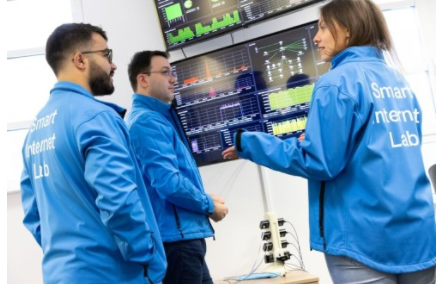Funding for Bristol’s two new projects is part of the UK Government’s £50 million package to boost innovation in mobile network technology. This investment will support the UK’s infrastructure innovation ecosystem and contribute to the delivery of the 5G Supply Chain Diversification Strategy.
The University of Bristol’s Smart Internet Lab is already known for its pioneering research into 5G and played a major role in the Government’s £200 million 5G Testbeds and Trials program.
Both projects will also work alongside the ecosystem developed by Bristol Digital Futures Institute (BDFI) for developing sustainable, inclusive and prosperous futures.
The funding announced today by Digital Secretary Nadine Dorries will see the University work with two leading technology companies, Cellnex UK and Parallel Wireless, to accelerate the development of a new wireless communication technology known as high-performance Open Radio Access Networks (Open RAN) solutions.
Importantly, this technology enables mobile networks to be built using a variety of different equipment suppliers, where previously all components were provided by a single supplier.
The government committed £36 million in funding for fifteen projects through its Future Radio Access Network Competition (FRANC) to develop and trial the new Radio Access System technologies across Scotland, Wales and England, so it can fulfil its ambition for 35 per cent of the UK's mobile network traffic to be carried over Open RAN by 2030.
The O-RANOS project with Cellnex UK is a UK-led consortium of industry partners that is developing a new software-based platform to create a testbed public and private cellular network and the world's first backhaul over the LEO Constellation. As the leading academic partner and an O-RAN Alliance member, the Smart Internet Lab will perform novel research on AI/ML software tools for RAN optimisation and will provide access to their testbeds, capable of hosting research for efficiently maintaining complex multi-vendor O-RAN infrastructure.
The Proteus project, led by Parallel Wireless, will instigate fundamental breakthroughs by developing an entirely new supplier ecosystem to implement the Open RAN strategic diversification vision. Through this diversification the project will enable cost and power consumption reductions and create an alternative technology portfolio. The Smart Internet Lab’s unique research expertise and test network are critical to support an ecosystem of open innovation of solutions and applications.
Professor Dimitra Simeonidou, Co-Director of BDFI and Director of the Smart Internet Lab, said: “We are delighted the Smart Internet Lab will work with industry partners in these projects that will transform UK telecoms. Unlocking the potential of Open RAN is a key component of fulfilling the UK’s 5G Supply Chain Diversification Strategy and this investment will drive research and innovation on open architectures for future mobile networks marking a step forward towards the next generation, 6G.
“The projects are also sociotechnical in nature as they will fundamentally drive the democratisation of telecoms infrastructure, develop affordable connectivity for urban and rural areas, focus on energy efficiency and continue the encouragement of digital innovation in the Bristol region.”
It is envisioned that the projects will attract new 5G RAN suppliers to conduct research and development in the UK and foster professional collaborations between potential new entrants into the UK’s public network.
The projects also address sociotechnical issues
Digital Secretary Nadine Dorries said: “5G technology is already revolutionising people’s lives and businesses - connecting people across the UK with faster mobile data and making businesses more productive.
“Today we are announcing a further £50 million to put the UK at the forefront of mobile connectivity and to make sure our telecoms networks are safe and secure now and in the future. We can only do this through stronger international collaboration and I will be meeting with our US allies today as we strengthen our ties on technology.”
